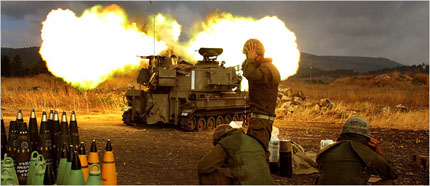Just War

—Benjamin Franklin
My religion column for tomorrow's Tribune & Georgian is now online: Which Cause Is Right in the Israeli-Lebanese War?. In the column, I apply Just War Christian tradition to the present situation in Israel and Lebanon.
The Just War tradition has been worked on by some of the best Christian thinkers including Augustine of Hippo and Thomas Aquinas. The short version is that war is to be a last resort used by a right authority with right intention in a just cause when there is a probability of success that further keeps non-combatants immune in a proportionate response. The column looks at these issues using the current conflict as an example. Read more here.
From Sojourners, I read this quote:
"Sunday morning, I woke up to the news that an Israeli air strike hit a residential building used as a shelter in the southern Lebanese town of Qana, killing and wounding more than 65 people, including 30 infants and young children. According to tradition, Qana is the village where Jesus Christ performed his first miracle by turning water into wine (John 2).The chaplain is on to something, of course. We are to ask in every situation, "Where is Christ in this?" As in most wars, one answer is "Under the rubble with the hurt and dying."
Now I hear of fellow Christians who enjoy seeing the turning of water into blood in the name of end-time prophecy. Their call should rather be to turn water into wine of gladness, peace, and life. Are we looking for the presence of Christ in Lebanon and Israel or for the presence of U.S. smart bombs?"
- Riad Kassis, executive director and chaplain at the J.L. Schneller School in West Bekaa, Lebanon.
peace,
Frank+
The Rev. Frank Logue, Pastor + King of Peace Episcopal Church








5 Comments:
At 8/03/2006 8:01 AM, King of Peace said…
King of Peace said…
Belief.net has an interesting article Jews' Pain the World's Gain on the occasion (last evening) of the saddest day in Jewish history, a day which almost inexplicably continues to resonate with new Jewish pain through the centuries as this is the date of the destruction of both the First and Second Temples in Jerusalem, the expulsion of Jews from Spain in 1492 and on and on. His commentary does not directly relate to the post above, but it is certainly not unrelated to consider this important date alongside thoughts of justice in war.
At 8/03/2006 3:02 PM, Anonymous said…
Anonymous said…
This is definitely a time to heed the Biblical admonition to pray for the peace of Jerusalem. I offer no blindingly brilliant solution to the whole problem - of course - but am reminded that the end times we are all looking for seem to be centered on this area of the world. We should all be ready to meet our Lord because we don't know the day or the hour of His return.
One comment / question of Just War doctrine, though. If I'm correct in understanding, it says we shouldn't fight a war without a reasonable chance of success. I've always been led to believe that there are some things worth fighting for even if you're not sure of the outcome. I guess a fuller explanation of the doctrine is in order and if you've already given one somewhere, please point me to it.
Thanks and blessings,
Kenny
At 8/03/2006 3:48 PM, King of Peace said…
King of Peace said…
Kenny,
The only thing relevant in the archives is a handout from a Christian Ethics class I did on Just War Theory: http://www.kingofpeace.org/justwar.pdf. It will give you no more detail on probability of success.
I do agree that some causes are worth dying for and so worth fighting for with no probability of success. However, traditional thinking in this area is on how leaders make a decision to go to war and as Jesus said,
"What king, when he sets out to meet another king in battle, will not first sit down and consider whether he is strong enough with ten thousand men to encounter the one coming against him with twenty thousand? Or else, while the other is still far away, he sends a delegation and asks for terms of peace." Luke 14:31-32.
The idea behind probability of success is that in committing to war a king or other leader will create such suffering among their own people and those attacked that the suffering created should not be for nothing. Starting a war with no chance a winning it would therefore demand that people suffer for nothing. That's the theory anyway.
But with any ethical delimma, it always comes to specific cases. This isn't Relativist Ethics, but a more pragmatic question of "Will my troops be like the Australians at Galipoli or the English at Agincort?"
Just War tradition says it is best to sue for peace if your troops would head into the Charge of the Light Brigade.
peace,
Frank+
At 8/03/2006 9:53 PM, Anonymous said…
Anonymous said…
Thanks, that does clear things up for me. And, I'm sure you're glad to know, your comments get me to thinking even more.
I was thinking mostly of defensive warfare in my original question. The Biblical reference you gave is not clear on whether the "inferior" force is the aggressor in the situation. Jesus most definitely doesn't say "don't fight", does he?
And, can I be frank with you? ;) I'm not so sure that the reference from Luke is that applicable to warfare per se. Jesus also goes on to say to his potential disciples that they must be willing to count the cost of their following Him. That's good advice but, as I'm sure you can testify, there's really no way we can foresee what our devotion to Christ will cost. But there will surely be a cost.
Just as the English at Agincourt went to battle against what appeared to be a superior foe, sometimes we can lose sight that we really are on the victorious side. The battle's already been won, we're just in the mopping up stages. For a more Biblical reference, the story of Elisha praying for his servant's eyes to be opened to the surrounding chariots of fire comes to mind.
Anyway, that's enough for now...
Thanks again,
Kenny
At 8/04/2006 6:24 AM, King of Peace said…
King of Peace said…
The reference to Luke's Gospel in the comment above is not one that I would personally use related to this issue. However, Early Church Fathers like Augustine read scripture differently.
They could know that Jesus was using the comment about a king suing for peace as part of a larger argument (after all in the example of Augustine, he was trained in Rhetoric) but still use the lesser point about the king and suing for peace as a literal admonition itself. Scripture was read differently 1600-1800 years ago than it is now and that also effected how it was read 500 years ago and so on.
In fact, in the earliest centuries, much emphasis was placed on allegorical interpretations of many texts and these readings became highly influential. Someone who know more on this than me could fill in more here.
peace,
Frank+
Post a Comment
<< Home